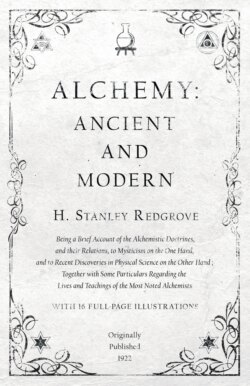Читать книгу Alchemy: Ancient and Modern - Being a Brief Account of the Alchemistic Doctrines, and their Relations, to Mysticism on the One Hand, and to Recent Discoveries in Physical Science on the Other Hand - H. Stanley Redgrove - Страница 10
На сайте Литреса книга снята с продажи.
The Transcendental Theory of Alchemy.
Оглавление§ 2. By some mystics, however, the opinion has been expressed that Alchemy was not a physical art or science at all, that in no sense was its object the manufacture of material gold, and that its processes were not carried out on the physical plane. According to this transcendental theory, Alchemy was concerned with man’s soul, its object was the perfection, not of material substances, but of man in a spiritual sense. Those who hold this view identify Alchemy with, or at least regard it as a branch of, Mysticism, from which it is supposed to differ merely by the employment of a special language; and they hold that the writings of the alchemists must not be understood literally as dealing with chemical operations, with furnaces, retorts, alembics, pelicans and the like, with salt, sulphur, mercury, gold and other material substances, but must be understood as grand allegories dealing with spiritual truths. According to this view, the figure of the transmutation of the “base” metals into gold symbolised the salvation of man—the transmutation of his soul into spiritual gold—which was to be obtained by the elimination of evil and the development of good by the grace of God; and the realisation of which salvation or spiritual transmutation may be described as the New Birth, or that condition of being known as union with the Divine. It would follow, of course, if this theory were true, that the genuine alchemists were pure mystics, and hence, that the development of chemical science was not due to their labours, but to pseudo-alchemists who so far misunderstood their writings as to have interpreted them in a literal sense.
